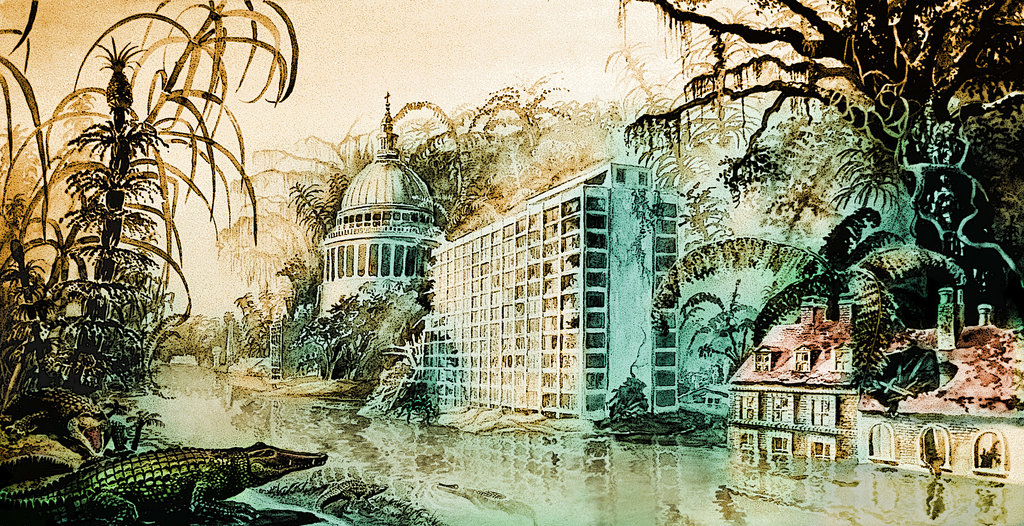
All About That Barnabas
“Dark Shadows” looms over the house near the bluffs in CollinsPortland, and only one man perceives the significance of this Gothic soap opera as it pertains to a strange and momentous period in his life.
Recently released from a secret prison inside the CollinsPortland Cannery Association, this media assassin for hire now contemplates his new-found freedom and potential next steps. He is unaware that his Cavalier King Charles Spaniels are secretly plotting to send him to a sanitarium for hopeless souls unable to identify a firm line between TV and reality.
What these two thankless toy dogs fail to realize is that the man they accuse of insanity may be dangerously close to unraveling their duplicitous plan, and in the process, the true, insidious nature of procrastination.
I like to watch my stories. From “Farscape” to “Breaking Bad,” “Buffy The Vampire Slayer” to “The Wire,” there’s something about being totally submerged in a foreign world that does a body good. Actually, scratch that. It does a brain good. If it wasn’t for Lloyd Athletic Club, TV would do my body in.
Especially in times of turmoil, when our futures are most uncertain, there’s something so womb-like and familiar about living through our favorite characters that I doubt the impending takeover of the world by machines will require The Matrix to keep us docile. Even for an ace escape artist such as myself, the real world has a way of creeping into my fantasy time in the most unexpected of ways.
Take “Dark Shadows,” for instance. Despite having consumed nearly the entirety of HBO, FX, AMC and Netflix’s original programming – and working to develop a special helmet that will allow me to consume new shows when they’re still only ideas in their creators’ defenseless minds – I’ve never truly watched a soap opera in the classic sense. Sure, “Lost” was a soap opera, but the production values and time slot allowed us to believe that it wasn’t, much like we were able to believe that the leg statue with only four toes that Sayid saw in season two would have any goddamn significance whatsoever.
“Dark Shadows ” is the real deal. It aired five times a week for a half hour a pop from 1966 to 1971. That’s 1,275 episodes, and a couple of movies if I’m not mistaken. Now, that’s a world that will not only distract you, but if you’re not careful, might just swallow your soul.
If your only exposure to the world of “Dark Shadows” is the tonally obscene Tim Burton/Johnny Depp wank of a few years ago, my apologies. Then again, it might have been worth it if only to see Eva Green play Angelique. If there’s one guiding principle in my life, it’s that no Eva Green movie is too shitty to sit through. Plus, if you’re familiar with that film’s previews, you’ll know the basic plot. Vampire Barnabas Collins is released from his tomb after being imprisoned for hundreds of years, forever altering the lives of the good people of Collinsport. There’s a lot more to it than that, but if the idea of a pioneering supernatural entry into the world of ’60s soaps doesn’t pique your interest, that’s likely all you need to know. But hardly all you need to read.
“Dark Shadows” is the MacGuffin of this piece, but a MacGuffin is only as good as the specificity with which it is rendered. Any halfway decent TV show – or movie, album, book, painting, or Eva Green GIF – should ultimately thwart your attempts to escape by turning what appears to be a door to another world into a mirror. You begin looking outward, but if you watch obsessively enough, you might just catch glimpses of yourself in the machinations and flailings of your new fictional friends.
And now, some things I’ve learned or been reminded of from watching “Dark Shadows” during my recent period of unemployment:
– You can’t keep a good man (or woman) down: Like many TV shows, “Dark Shadows” had its share of problems with actors, forcing the regular recasting of parts. In the early days of the show, wronged man/bad boy Burke Devlin was played by the memorable character actor Mitchell Ryan. One day, a strange voiceover at the beginning of the show announced, “Today the part of Burke Devlin will be played by Anthony George.” Like that, Ryan was gone, never to return. What happened to Ryan? Allegedly he was fired for his alcoholism, but he would eventually return in a number of memorable parts, including The General in “Lethal Weapon.” He would also completely dominate the world of ’80s and ’90s action TV shows, playing heavies and other domineering types on: “The A-Team,” “Hardcastle and McCormick,” “Riptide,” “Hart to Hart,” “Star Trek: The Next Generation,” and PRETTY MUCH EVERY OTHER SHOW OF THE ERA. Is he a household name? Not by a long shot. But he had a successful career doing what he loved through 2009. That, my friends, is inspirational.
– You may only get one take, but it can have a shit-ton of mistakes in it: Back in the early days of video tape, editing was incredibly expensive and time-consuming. Thus, unless an actor dropped trow in the middle of a scene, they were likely going to keep on rolling. At first, this seemed insane to me, but the more I watched, the more I became fascinated by actors flubbing their lines or forgetting them altogether. Some of the performances were terrible (I’m looking at you Grayson Hall), but mostly it was just serviceable (to quite talented) actors doing their best to nail it on the first take. Beyond the acting, boom mics would drop into the screen, rubber bats would function erratically, music cues would happen at inappropriate moments, and the camera would often dart about the screen inexplicably, like that dog from “Up” catching a glimpse of a bushy tail in the distance. Some might dismiss this as “cheesy,” but I’ve come to appreciate this very human element of the show. Sometimes fate drops a boom mic on your head in the middle of a scene of your life, causing you to totally flub your lines. But the video tape of life is expensive and impossible to cut, and so you just keep going and hope for the best. Plus, sometimes, those obvious fuck-ups are the funniest part of the show, and you’ll find yourself laughing at them long after you’ve forgotten the takes that went splendidly.
– If all else fails, create a new character: Few are familiar with the first season of “Dark Shadows,” before the appearance of Barnabas Collins. Ratings-wise, it was a bit of a turd. But as soon as they turned the vaguely Gothic atmosphere into a full-blown supernatural bloodbath, ratings soared. As one actor noted in the DVD commentary, occasionally producer Dan Curtis and his team of writers would abandon storylines altogether if they just weren’t working out. This is perhaps the most powerful lesson of all. When you have a show to make, or a life to live, you can’t spend your time fretting over what didn’t work. Learn from it and move on. If daytime soap fans don’t dig what you’re doing, put enough monsters and madness in there to hook the teenage crowd and laugh all the way to the history books. In my life, perhaps it won’t be monsters and madness (although it often is). Maybe it will be this blog and some new job that I just applied for last week. Maybe it will be the children’s book I’ve developed with my wife. Most likely it will be some insane new plot twist that I can’t yet imagine. The point is, don’t be afraid to let one story die and begin another one, even if it means reinventing yourself as Nosferatu in a Caesar haircut. Fate is a fickle audience, and sometimes you just have to throw caution to the wind put a vampire on it.
Cue spooky theremin music, cut to a room in the house near the bluff in CollinsPortland, and roll credits. Tomorrow’s another episode.
From The Void is a Jake Ten Pas production.




